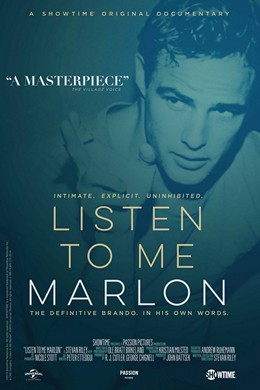This is part of the Summer Under the Stars Blogathon. Today's star is Marlon Brando.
Marlon Brando is held up as the definitive screen actor, one who is the model, good or bad, for every actor that has come after him. The popular perception of Brando is that of a great talent done in by his own hungers, degrading himself for money, who shifted from being passionate about his craft to simply not caring about it. Listen to Me Marlon is his story, told in his words, that reveal the how of his life and career. Perhaps they even reveal the why, though that requires more digging.
Culled from thousands of hours of audio recordings he made throughout his life, Listen to Me Marlon has Brando speak what we would call "his truth". He speaks of everything: his fraught childhood, his entry into acting and the powerful influence of acting mentor Stela Adler, the transition from stage to screen. He also speaks of the various triumphs and tragedies personal and professional.
There is the highly troubled life of his son Christian, from the kidnapping he endured to the murder trial that brough the reclusive Marlon out into the harsh light of infamy. There is the disillusionment he had with the art of acting, recounting how Mutiny on the Bounty was his worse experience film-wise apart from the discovery of Tahiti. He calls a now-forgotten film, Candy, the worst movie he made, bringing him shame long after its debut.
Brando also speaks of how he did get into the part of Vito Corleone in The Godfather, his openness and rawness in Last Tango in Paris (even if he felt director Bernardo Bertolucci dug too deep into Brando) and how despite how he understood Kurtz in Apocalypse Now he had contempt for both the film and its director, Francis Ford Coppola. From taking $14 million for twelve days work in Superman to how there are better scenes than "I could have been a contender" in On the Waterfront, Marlon Brando hides nothing.
We do not get a background on why Brando recorded his deepest thoughts and memories (some tapes are marked "Therapist" but whether he meant a literal therapist or himself for therapy is unclear). We also do not get anyone else speaking outside of interviews where Brando was not the only person being interviewed (such as his father or Adler). As such, we get Brando and Brando only.
This is a positive in that no one is "explaining" or "contextualizing" his thoughts, his words, his memories. Instead, director and cowriter Stevan Riley (writing with Peter Ettedgui) shapes only the structure of Listen to Me Marlon, not the words, via archival footage and newly shot scenes of nature.
What we hear from Brando is an elegant, intelligent usage of words. "You are your memories", he says early in the film. From those memories, we hear Brando speak to us on something surprisingly contemporary: the digital use of actors. A few times we see a computer-generated Brando recite Shakespeare, which is in turns frightening and mesmerizing.
This is an uncensored Brando, one who recognizes his sexual prowess when A Streetcar Named Desire took Broadway and later Hollywood by storm. We also learn that he was nothing like the brutish Stanley Kowalski. Far from it, he hated the character for that brutishness. He also dismisses the oft-praised "I could have been a contender", insisting that it is not his best scene or performance. Rather, the reason it resonates according to Brando is because the audience identifies with Terry Malloy, not with Brando's performance.
Despite his reputation for seriousness, Brando realized that actors are entertainers as well as serious storytellers. As such, he saw nothing wrong with going from the deep drama of A Streetcar Named Desire to the musical Guys and Dolls. He, in his own words, said that acting was "lying for a living".
We see Brando in unguarded moments, such as his clowning around with fellow Method actor Montgomery Clift. We see him being flirtatious with female reporters (though that flirtation might now be considered sexual harassment). Aspiring actors can learn from his advice, such as "You have to know your subject. You have to know the character".
Listen to Me Marlon is as open a portrait of the artist in full, as if Marlon Brando had us over and began his long confessional. We learn from and about him, beyond the parody of himself he presented on and off screen at the end of his life and career. The promise, the cynicism, the great highs and tragic lows: Marlon Brando touches on them all, unguarded and unafraid to see the truth.
"These are old tapes, no longer usable, no longer useful. Chuck 'em", he says near the end. Whether he ever intended for others to hear his thoughts is something no one can answer. Fortunately, we do hear them, and learn much about this most fascinating and frustrating of film figures. We are all glad that we did listen to Marlon.



No comments:
Post a Comment
Views are always welcome, but I would ask that no vulgarity be used. Any posts that contain foul language or are bigoted in any way will not be posted.
Thank you.